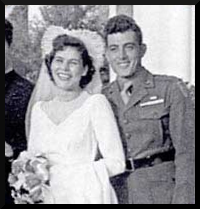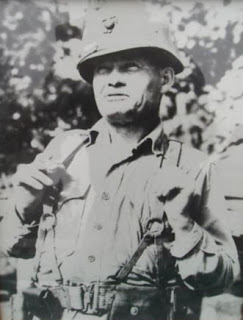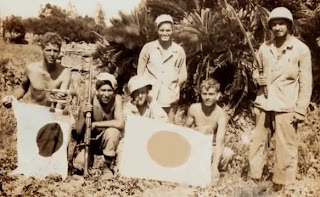Having just finished
Helmet For My Pillow by Robert Leckie (great book by the way) I am now starting
With The Old Breed by Eugene Sledge. HBO's miniseries
The Pacific was based on these two books.
Eugene Sledge and Actor Joe Mazzello from HBO's The Pacific
I you are watching
The Pacific then you might have some interest in the real men behind the characters in the show. Please enjoy some of the information I have located on Marine Veteran and Author E.B. Sledge.
A young Eugene Sledge
Eugene Bondurant Sledge (November 4, 1923 – March 3, 2001) was a United States Marine, university professor, and author. His 1981 memoir
With the Old Breed: At Peleliu and Okinawa was, in part, the basis for Ken Burn's PBS documentary,
The War on World War II and for the HBO series on the Marine Corps in the Pacific Theater during World War II.
E.B. Sledge
Eugene B. Sledge was born on November 4, 1923 and grew up at Georgia Cottage in Mobile, Alabama. The great-grandson of Confederate officers, Sledge was bookish and frail as a child. However, his physician father brought him up to be accustomed to the outdoors. Having learned to fish and hunt from his father, he was fond of venturing outdoors into the woods with his best friend Sidney Phillips. After Pearl Harbor was bombed on December 7, 1941, Sledge wished to join the Marines with his friend Phillips. A heart murmur prevented him from joining up at that time, however, and Phillips went off to the recruitment post alone. Sledge graduated from Murphy High School in Mobile in May 1942, and entered Marion Military Institute in Marion, Alabama, that fall.
Sledge and His Father in HBO's The Pacific
During the scene pictured above Sledge's father, a doctor, tells him "The worst thing about treating those combat boys from the Great War wasn't that they had had their flesh torn, it was that they had had their souls torn out."

Sledge (Joseph Mazzello) hits the beach at Peleliu
Sledge enlisted in the U.S. Marine Corps in December 1942 to train as an officer, but in order not to "miss the war" he joined as an enlisted man and was eventually assigned to Kilo Company, 3rd Battalion, 5th Marines, 1st Marine Division (K/3/5). He served as a Private First Class in the Pacific Theater and saw combat as a 60 mm mortarman at Peleliu and Okinawa. When fighting grew too close for effective use of the mortar he served other duties such as stretcher bearer and providing rifle fire. During his service, Sledge kept notes of what happened in his pocket sized New Testament. When the war ended, he took these notes and compiled them into the memoir that was to be known as
With the Old Breed. After being posted to Beijing (then known as Peiping), China after the war, he was discharged from the Marine Corps in February 1946 with the rank of Corporal.
Sledge during happy times in the Marine Corps
After the war, Sledge attended Alabama Polytechnic Institute (now Auburn University) where he received a Bachelor of Science degree in the summer of 1949. Sledge, like many other war veterans, had a hard time readjusting to civilian life. “As I strolled the streets of Mobile, civilian life seemed so strange,” Sledge wrote. “People rushed around in a hurry about seemingly insignificant things. Few seemed to realize how blessed they were to be free and untouched by the horrors of war. To them, a veteran was a veteran – all were the same, whether one man had survived the deadliest combat or another had pounded a typewriter while in uniform.”
Sledge is center smoking the pipe
Once an avid hunter, Sledge gave up his hobby. He found that he could not endure the thought of wounding a bird and said that killing a deer felt like shooting a cow in a pasture. His father found him weeping after a dove hunt where Sledge had to kill a wounded dove and in the ensuing conversations he told his father he could no longer tolerate seeing any suffering. A key turning point in his life and career followed when his father advised him that he could substitute bird watching as a hobby. Sledge started to assist the conservation department in its banding study efforts, the origin of his well known passion for the science of ornithology.
Sledge was such a young man, imagine the horror he witnessed
When he came to enroll at Auburn University, the female at the register office asked him if the Marine Corps taught him anything useful. Sledge replied saying "Lady, there was a killing war. The Marine Corps taught me how to kill Japs and try to survive. Now, if that don't fit into any academic course, I'm sorry. But some of us had to do the killing -- and most of my buddies got killed or wounded." He found his salvation in science, it kept the flashbacks of Peleliu and Okinawa at bay. Close, constant study of nature prevented him from going mad. However, the war stayed with him, and finally at the urging of his wife, he began to put his thoughts on paper, at last allowing him to put his horrors behind him. He returned to Auburn in 1953 where he worked as a research assistant until 1955. That same year he graduated from API with a Master of Science degree in botany. From 1956 to 1960 Sledge attended the University of Florida and worked as a research assistant. He published numerous papers on helminthology and in 1956 joined the Helminthological Society of Washington. He received his doctorate in biology from the University of Florida in 1960. He was employed by the Division of Plant Industries for the Florida State Department of Agriculture from 1959 to 1962.

Sledge loved Biology
In the summer of 1962, Sledge was appointed Assistant Professor of Biology at Alabama College (now the University of Montevallo). In 1970 he became a professor, a position he held until his retirement in 1990. He taught zoology, ornithology, comparative vertebrate anatomy and other courses during his long tenure there. Sledge was popular with his students, organizing field trips and collections around town. Eugene Sledge died after a long battle with stomach cancer in 2001. (source
wiki )
Eugene's Marine Discharge



































